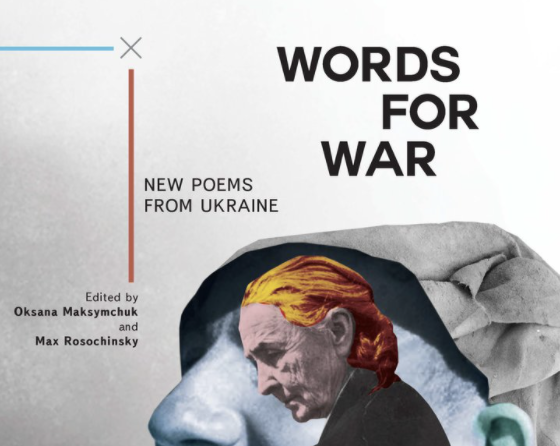I ask
Half-awake
Is poetry possible
At the moment history stirs
Once its steps
Reverberate through every heart?
— From “Can there be poetry after” by Anastasia Afanasieva, translated by Kevin Vaughn and Maria Khotimsky
With the current Russian invasion of Ukraine, we at The Common have been reflecting on the powerful words of many Ukrainian poets who have appeared in our pages. In recent years their work has been rooted in conflict, as the country struggled first with self-determination and later with the Russian annexation of Crimea and, since 2014, with a Russian-incited war in the East. This focus lends a feeling of prescience and timeliness to their work now, even though most of these poems are not new. We hope you’ll make time to read and reflect on the work of these poets, as we all keep Ukraine and the Ukrainian people in our thoughts.
Serhiy Zhadan
 Serhiy Zhadan, a Ukrainian poet and novelist, was born in the Luhansk region in 1974; today his name stands for both civic and cultural revival in Ukraine. He belongs to the generation that witnessed the collapse of the Soviet Empire and its many consequences—the attempt, and failure, to build democracy, the revolutions, disappointments, and renewal of hope. Zhadan’s work depends on street life—the tender, mighty, and precarious life of Ukrainian society—in Kharkiv, Kiev, and other places. When Zhadan writes about current events in Ukraine, he manages to find a point of expression utterly remote from propaganda—his message is complex and humble, he pays attention not to the lofty ideas but rather to the actors of history, on both sides of the conflict, dignified or less so. And even when he does not write of history and its battles directly—when he writes about travel or erotica or just daily passing observations, his poetry strikes one as that of politeia—Zhadan is committed to individual lives within society.
Serhiy Zhadan, a Ukrainian poet and novelist, was born in the Luhansk region in 1974; today his name stands for both civic and cultural revival in Ukraine. He belongs to the generation that witnessed the collapse of the Soviet Empire and its many consequences—the attempt, and failure, to build democracy, the revolutions, disappointments, and renewal of hope. Zhadan’s work depends on street life—the tender, mighty, and precarious life of Ukrainian society—in Kharkiv, Kiev, and other places. When Zhadan writes about current events in Ukraine, he manages to find a point of expression utterly remote from propaganda—his message is complex and humble, he pays attention not to the lofty ideas but rather to the actors of history, on both sides of the conflict, dignified or less so. And even when he does not write of history and its battles directly—when he writes about travel or erotica or just daily passing observations, his poetry strikes one as that of politeia—Zhadan is committed to individual lives within society.
— Excerpted from an introduction by Polina Barskova
July 2015 Poetry Feature (translations by Ostap Kin)
- A Moveable Feast
- Suicides
- (And the smallest little girl in Chinatown)
- (Somehow you managed to grow up in this crack between states)
- To Live Means to Die
September 2017 Poetry Feature (more from other poets below)
- “Third Year Into the War,” translated from the Ukrainian by Valzhyna Mort
Issue 12, Fall 2016 (translations by Ostap Kin)
Special Feature on the Best American Poetry blog
All poems translated by Ostap Kin and John Hennessy, blog by John Hennessy
- We’ve Been Talking About War for Three Years (part one)
- (They buried their son last winter)
- We’ve Been Talking About War for Three Years (part four)
WORDS FOR WAR, NEW POEMS FROM UKRAINE

In September 2017, The Common published a selection from the anthology WORDS FOR WAR, NEW POEMS FROM UKRAINE. The armed conflict in the east of Ukraine brought about an emergence of a distinctive trend in contemporary Ukrainian poetry: the poetry of war. Directly and indirectly, the poems collected in this volume engage with the events and experiences of war, reflecting on the themes of alienation, loss, dislocation, and disability; as well as justice, heroism, courage, resilience, generosity, and forgiveness. In addressing these themes, the poems also raise questions about art, politics, citizenship, and moral responsibility. The anthology brings together some of the most compelling poetic voices from different regions of Ukraine. Young and old, female and male, somber and ironic, tragic and playful, filled with extraordinary terror and ordinary human delights, the voices recreate the human sounds of war in its tragic complexity.
— Introduction by John Hennessy
- ANASTASIA AFANASIEVA | “Can there be poetry after:”
- BORYS HUMENYUK | “Our platoon commander is a strange fellow”
- ALEKSANDR KABANOV | “He came first wearing a t-shirt inscribed ‘Je suis Christ,’”
- KATERYNA KALYTKO | “April 6”
- LYUDMYLA KHERSONSKA | “When a country of — overall — nice people”
- SERHIY ZHADAN | “Third Year into the War”




